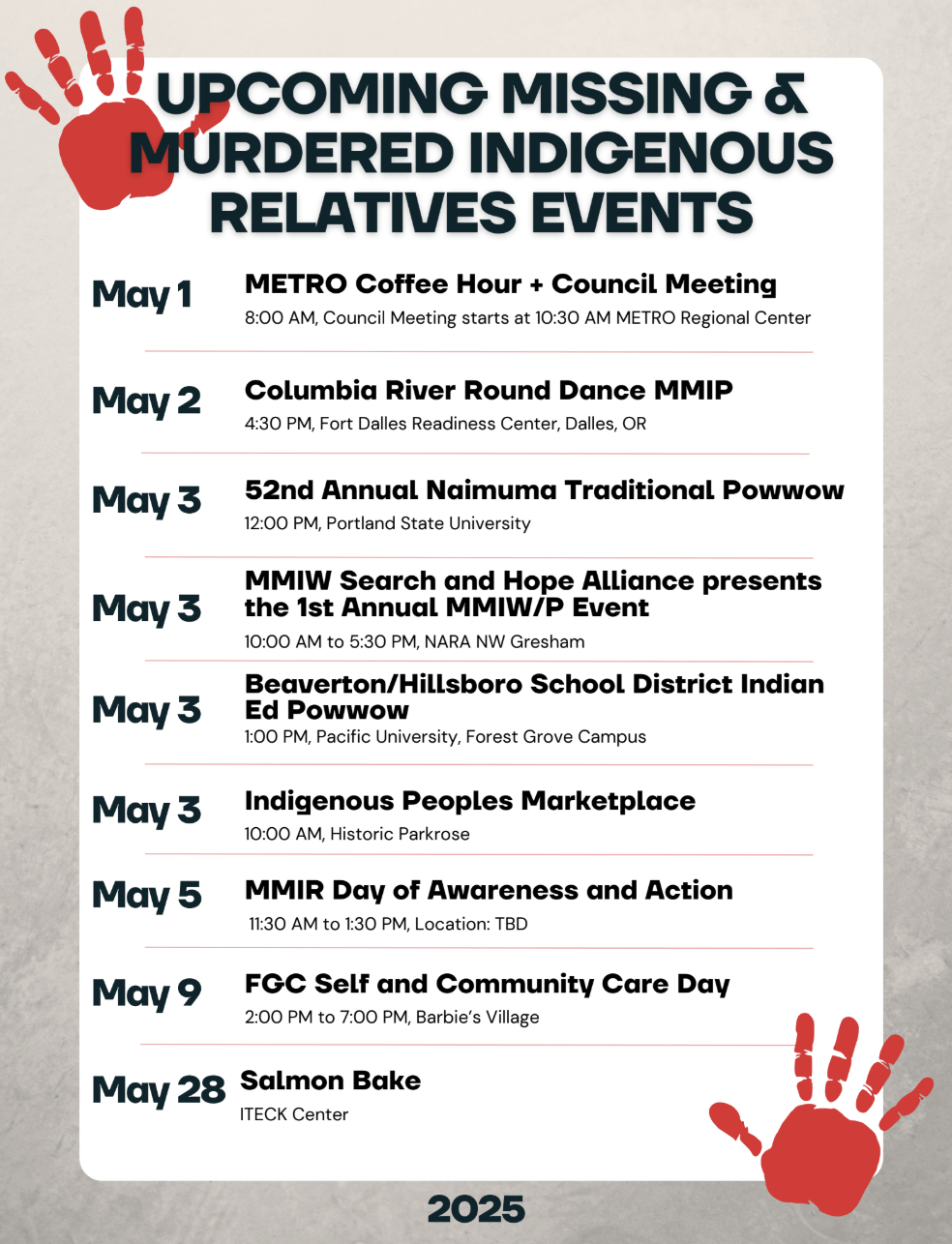PDX Agenda Tracker: Happy May Day! | May 1, 2025
May Day Events... Missing and Murdered Indigenous Persons Day... Metro's Federal Legislative Agenda... Metro's Budget... $15M to Multnomah County to address unsheltered homelessness...
Dear Readers,
May Day, aka International Workers’ Day, is back in full force in Portland and across the state this year, with rallies, marches, film screenings, and forums. The city is showing up for workers’ rights, from union-led actions on Thursday to weekend events for folks who can’t afford to miss work.
While May Day has ancient roots as a springtime celebration, it also marks a pivotal moment in labor history: the May 1, 1886, general strike for the eight-hour workday that sparked the Haymarket Affair in Chicago. Born of struggle, fueled by solidarity, May Day has been a day for the working class to celebrate gains, mourn losses, and organize for a better future ever since.
Given the growing attacks on workers, immigrants, and marginalized communities—locally and nationally—this year’s May Day carries renewed urgency. If you're looking for ways to get involved or learn more, the Portland Mercury has a great roundup of events and a short history of the holiday’s radical U.S. origins.
👉 Read it here
With Love, Hope & Solidarity,
Chloe

Hey there! If you’ve been thinking about becoming a paid subscriber, now’s the time. If money’s tight, consider the budget rate: $3/month or $30/year. Doing alright? The standard $6/month or $60/year helps a lot. If you’re feeling flush, you can become a sustainer at $100/year.Multnomah County Board of Commissioners
Thursday, May 1, 2025 | ⏰ 9:30 AM
Nothing of interest for Street Wonk readers this week.Metro Council
Thursday, May 1st | ⏰ 10:30 AM
Presentation
Observing Missing and Murdered Indigenous People’s Day of Awareness
Metro staff and Native community leaders present a 45-minute session honoring Missing and Murdered Indigenous Peoples (MMIP) Day of Awareness. The presentation confronts the crisis at its roots—colonization, forced removal, jurisdictional failure, and systemic neglect—and centers Native voices in the fight for justice.
More than 84% of Native women experience violence. Homicide is a leading cause of death for Native people aged 1 to 45. Most MMIP cases go unsolved due to underreporting, poor data, and lack of jurisdiction, especially when non-Native perpetrators are involved.
Metro has recognized MMIP since 2018 and recently formalized that commitment through Resolution No. 23-5336. But this can’t be symbolic. Speakers urge the council and staff to apply this understanding across all Metro programs—from land access and environmental stewardship to transportation and planning. Recognition is just the beginning. Systemic change is the goal.
FURTHER READING
Oregon bill seeks OHA’s involvement in Missing and Murdered Indigenous People response (OPB)
Missing and Murdered Indigenous Peoples—Using an All-of-Government Approach to Address this Crisis (Department of the Interior)
RESOLUTIONS
For The Purpose of Adopting the Federal Legislative Agenda for the 119th Congress Metro Council is set to adopt its 2025–26 federal legislative agenda—an effort to hold the line under an aggressively regressive federal government. With Trump back in the White House, J.D. Vance as VP, and Republicans narrowly controlling Congress, Metro is bracing for rollbacks on immigration, climate policy, and public spending.
The agenda outlines key priorities: expanding affordable and supportive housing; defending climate action and environmental protections; investing in multimodal transportation and urban growth management; protecting tribal sovereignty; regulating firearms on public property; and funding workforce development and Metro-owned cultural venues. These focus areas are grounded in a broader values framework centered on equity, sustainability, and local control.
Metro’s federal power is limited, but this agenda makes its stance clear: defend what’s been won, stay alert for openings, and stand firm against policies that undermine the region’s long-term well-being.
For the Purpose of Approving the FY 2025-2026 Budget, Setting Property Tax Levies and Transmitting the Approved Budget to the Multnomah County Tax Supervising and Conservation Commission
Metro is set to approve its $1.86 billion FY 2025–26 budget, adopt related property tax levies, and transmit the approved budget to the Multnomah County Tax Supervising and Conservation Commission. A public hearing is scheduled for May 29, with final adoption expected on June 12.
The budget funds Metro’s core responsibilities—land use, transportation, parks and nature, and solid waste—while emphasizing racial equity, climate resilience, and shared prosperity. It also reflects Metro’s increasingly regional focus, with growing attention on cross-jurisdictional collaboration and long-term planning across policy areas.
For the Purpose Of Providing Up To $15,000,000 to Multnomah County to Support Investment in City of Portland Programs to Address Unsheltered Homelessness
Metro plans to authorize up to $15 million for Multnomah County to support City of Portland programs focused on unsheltered homelessness as part of its proposed budget. The funds will flow through the County but are earmarked for City-run programs—possibly including outreach, shelter, or support services. Specific uses have not yet been detailed.
Metro’s core responsibilities remain land use, transportation, parks, and solid waste, but this move suggests a growing role in the region’s homelessness response. Whether it marks a one-time contribution or a longer-term shift remains to be seen.
Wonk Out!
📖 Book:
Red Nation Rising: From Bordertown Violence to Native Liberation by The Red Nation (2021) A sharp, intersectional analysis of settler colonialism, capitalism, and Indigenous resistance—essential context for MMIP and systemic policy failures.
🎬 Film:
Our Movement Starts Here (2024)
Screening at Hollywood Theatre on May 1—this doc tells the story of an early environmental justice victory led by a majority-Black community in North Carolina. A powerful example of local organizing with national impact.
🎧 Podcast Episode:
NPR’s Throughline – “How U.S. Unions Took Flight” (2023)
A concise, accessible history of the U.S. labor movement that connects past May Day actions to today’s labor resurgence—perfect for listeners new to labor history.




